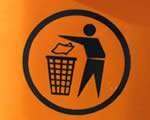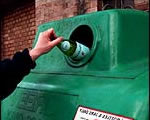 Go to main content
Go to main content
Archive Website of the UK government
Please note that this website has a UK government accesskeys system.
Main menu
Page menu
Environment and greener living

Recycling at home

Nearly two-thirds of all household rubbish can be recycled, saving energy and avoiding waste going to landfill. Find out how to recycle a wide range of goods - from batteries to clothes - and discover how recycling can help protect the environment.
Why recycle?
Recycling cuts down on the need for landfill. It also reduces the use of new materials and saves energy, helping to tackle climate change. Recycling just one aluminium can saves enough energy to run a television set for three hours.
What you can recycle
Recycling banks and bins usually show pictures of what you can put in them. When it comes to collections from your doorstep, your local council will be able to tell you what it can and can’t recycle.
Most councils are able to recycle paper, glass and plastics (plastic types 1 and 2 are the most commonly recycled). Some councils also collect metal and organic waste. Find out about recycling labels for plastics and other items on the 'Recycling and packaging labels' page.
Where you can recycle
Waste and recycling centres

Find your nearest recycling centre, and opening times
There are various places you can recycle, all run by your local council:
- recycling banks or bins in the community
- waste and recycling centres (also known as civic amenity sites, the tip or the dump)
- many councils collect recycling direct from outside your home – this is called doorstep or kerbside recycling
Opening times and locations of waste and recycling centres
Waste and recycling centres are run by local councils. To find out opening times and locations, you'll need to contact your council.
Your council can also tell you the times and dates of doorstep recycling and where to find recycling banks.
Use the links below to contact your local council.
Ideas for recycling more
Don't forget...
you can recycle shampoo and toiletry bottles, as well as washing powder and liquid containers
The list of what you can recycle is endless. Here are some ideas:
Recycling throughout your home
Many items in the kitchen are recyclable, including:
- plastic milk and water bottles
- household cleaning products bottles
- all glass packaging (all bottles and jars, but no cookware or pyrex)
- plastic food trays and wrappings are sometimes recyclable, so check the packaging for more details
Don’t forget you can also recycle items from the other rooms in your house, including:
- in the bathroom, rinsed shampoo bottles, cardboard packaging and toilet roll tubes
- in the bedroom, packaging from toiletries and make-up, and unwanted clothing
- when you’re doing the laundry, washing powder and liquid containers
Batteries
Rechargeable and non-rechargeable batteries can contain hazardous substances, so it’s important to dispose of them correctly:
- from February 2010 many shops and supermarkets that sell batteries will provide collection bins for old batteries
- some councils have collection schemes or provide battery recycling banks – contact your local council to find out more
- otherwise, take old batteries, including car batteries, to your local civic amenity site (waste and recycling centre)
Clothes and textiles
More than half of clothing that’s thrown away could be recycled. Most charity shops resell clothing, or you could take your unwanted clothes to clothing banks. Some councils also take textiles in doorstep recycling collections.
Mobile phones
Mobile phones are designed to last many years, so try to keep yours longer by avoiding unnecessary upgrades. When you need to get rid of your mobile phone:
- many phone shops will now take back old handsets for recycling
- there are organisations and charities that accept mobiles for refurbishment and recycling
- you could sell your phone on an online auction site
Printer cartridges
Many charities and workplaces collect print cartridges for refilling. More than a third of the 40 million used in the UK each year are already re-manufactured.
Full list of items you can recycle
A wide range of other things can be recycled – you can find out more from the RecycleNow website.
Remembering to recycle
Make it easier to remember to recycle by:
- putting your recycling bin next to your main bin
- making a note on your calendar or fridge of when your recycling is collected, and what can and can’t be recycled
Why recycling services vary across the UK
The recycling services you receive can vary from council to council. This is because:
- there are different challenges to cope with when collecting materials in rural or urban areas
- the availability of landfill varies from place to place
- some councils have better access to sorting equipment or can more easily find buyers for the materials they’ve collected
Check with your local council for more information.
Recycling and landfill

Seven out of ten people in the UK say they recycle
The global economic downturn may have led to a drop in demand for recycled materials. However, 95 per cent of material put out for recycling in the UK is still being recycled. Whatever the economic climate, recycling saves energy, reduces the amount of raw materials being used and helps to combat climate change.
Recycling is almost always a better option than burning or sending waste to landfill. In 2008, recycling household waste saved the same amount of CO2 that nearly a million return flights from London to Sydney would produce.
Councils are taxed for each tonne of rubbish they send to landfill (a site where rubbish is buried in the ground). This makes it more financially beneficial for them to recycle in most cases.
 Facebook
Facebook Twitter
Twitter StumbleUpon
StumbleUpon Delicious
Delicious Reddit
Reddit
